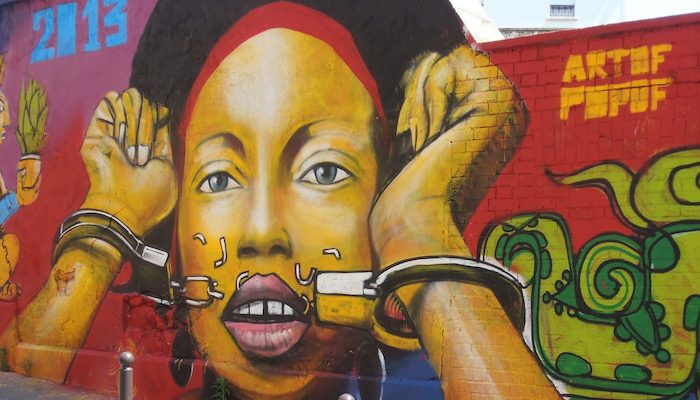
Black lives matter. We have been tweeting for a year. Race isn’t real, I tell my students. I cite the genetic evidence. West Africans are closely related to Europeans. I lie. “…. you suddenly find your tongue twisted and your speech stammering as you seek to explain to your six year old daughter why she can’t go to the public amusement park that has just been advertised on television, and see tears welling up in her eyes when she is told that Funtown is closed to colored children, and see ominous clouds of inferiority beginning to form in her little mental sky… (link)”
It is a large hall. They enter in noisy unruly groups. Fresh faced and young but no longer small children. Their attention is demanded, the school prize-giving begins. A number of young men stand awkwardly at the front with their certificates, their stance an attempt at covering conflicting emotions of satisfaction and embarrassment. The prize giver smiles broadly and gives a speech full of pride: ‘So many young men are killed but we know don’t have to worry about these guys’ – It is the start of dystopian movie. Something out of the The Hunger Games. A small vignette at the start of the film to tells you that things may look normal but they are not, there is a great threat lurking somewhere.
Katie was cold. Her legs covered in goose bumps. She whined at her father, whose reply was a glance of irritation and love. Twisting awkwardly due to the press of people Katie’s dad unfastened the bag and delved deep drawing out with difficulty some yellow leggings. Unceremoniously she pulled the leggings on over the goose bumps struggling to get the last bits on over her shoes. The leggings clashed with Katie’s pink skirt but she was a little warmer. Katie nestled up against her dad and started to absentmindedly pick at the flaking paint making the patch of rust larger. Her father looked to the horizon with hope, trepidation and not a small dose of weariness.
The boys descend from the platform, relived to be escaping the scrutiny of the hall, their smiles become more genuine. We see one of the teachers beaming, welcoming her charges back to the group with crinkle eyed joy. Other students jostle to greet, congratulate, make jibes.
Katie drowned. Have you seen her photo? It was well circulated. You have probably forgotten. We don’t remember for long. We don’t care. The photo, itself a violation in its own way, is circulated without even invoking the horror it surely should.
Did you see him? The skinny one in the bright orange t-shirt?
The British are highly compassionate. I remember Band Aid in the 1980s. The fervour with which people wanted to act, wanted to save those dying children from what is now Eritrea – the innocent victims, their weak limbs and wide eyes moved us, they were to be saved by ‘our’ benevolent gracious agency.
Did you see him, with his shy smile congratulating the lads when they returned from the stage?
Eritreans of course have their own agency, they always have, and some have chosen to flee oppression and violence as is their right. Once they act however,
The irony that many (almost a quarter) of the migrants are fleeing the same land as those who 30 years earlier ended up in “Geldof’s” camps passes this Katie by.
It’s early morning, still night really, the teacher rubs her eyes as she picks up her phone.
We like our African’s as victims reliant on our great humanitarians such as Geldof, to the point where whole countries come to be understood as beholden to him – ‘Geldof’s Ethiopia.’ Once they are survivors acting to protect their families and their lives they are vermin, why is that? The closeness of our rendering others as victims and rendering them as threats should not be ignored.
Her face is crumpled rather than crinkled now.
I am concerned that in our refrain that ‘Black Lives Matter’, we are really focusing on ‘black deaths’. That for Eritreans, and others, British compassion is over flowing when we are discussing black lives as zoë, as bare, purely biological, life as Agamben would have it. We cannot allow children from Eritrea to starve but their manner of living, their bios, does not matter. If migrants are survivors searching out more liveable lives ,they are not victims, they are vermin.
She hangs up. Presses her lips together. Takes a deep breath. And with a look of determination dials.
My Ghanaian host declares that he could never be persuaded that men are born equal. ‘Look at the birth of prince George’, he says, (Charlotte is not quite with us yet) ‘you are telling me that he was born equal?’ I think of the condition surrounding births in the rural area of Ghana that he is from and the idea of equality is surreal, fantasy, laughable.
A boy answers.
Many years ago Martin Luther King Jr., in a letter written from Birmingham jail, explained the urgency for action as rooted in the very daily experiences of being black. The manner of living matters.
No words. Tightly hanging on to their phones the boy and the teacher weep in ragged breath grief.
One year on. Black lives still matter.
Further Reading on E-International Relations
- Towards an ‘American Spring’ of Justice and Equality?
- Opinion – Racial Injustice and the Erosion of America’s Global Standing
- Reproducing the European Gaze Through Reflexivity: The Limits of Calling Out Failures
- Black Lives Matter, Poetry, and Pedagogy: On Gil Scott-Heron and Global Protests
- Theatres of Difference: The Film ‘Hair’, Otherness, Alterity, Subjectivity and Lessons for Identity Politics
- BDS and BLM: Positionality, Intersectionality and Nonviolent Activism